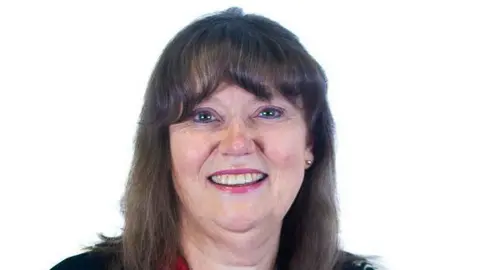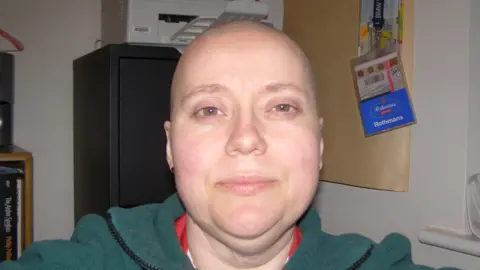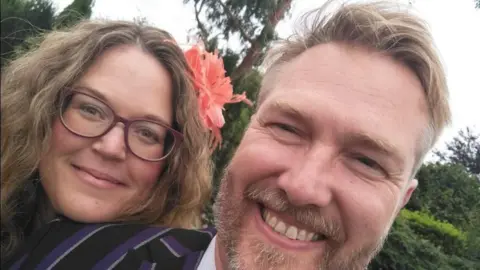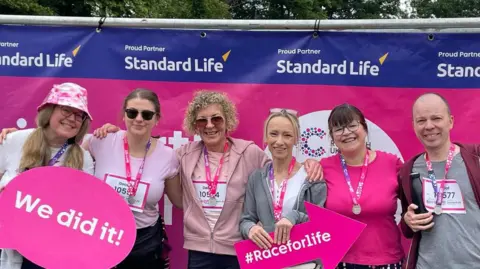'Breast cancer is more than surgery and chemo'
 Contributed
ContributedFor Cate Caruth's 39th birthday, she received a breast cancer diagnosis.
She had found a lump in one of her breasts but had no clue during treatment that she would also go through early menopause.
Following treatment, she had to overcome the fear the cancer would return before she set up a support group in her home town of Bury St Edmunds in Suffolk.
For Breast Cancer Awareness Month, the now 57-year-old is keen to show that cancer patients deal with more than just surgery and chemotherapy.
In the middle of 2005, when she was living in Kent, Ms Caruth noticed pain in her breast, and by October she had found a small, solid lump.
"At this point I was 38, and I was thinking there's no way; I'm too young," she said.
She had it checked, and on her birthday, she was given a stage three breast cancer diagnosis.
She underwent surgery to remove the tumour as well as chemotherapy and radiotherapy.
However, she said she had "no clue" she would face early-onset menopause.
"Suddenly, half way through chemotherapy, I got this hot flush with no idea what it was," she explained.
"You already don't trust your body, so you're already in a panic about everything."
Doctors told her this was normal due to the treatment damaging the ovaries, but Ms Caruth said often women were not aware of this.
 Contributed
ContributedHer treatment finished in August 2006, but Ms Caruth said she continued to struggle.
"Any squeak, any ache, any discolouration of the skin, my brain just went into red alert - it might be cancer," she said.
"That lasted five years, and you live with this fear tickling along in the background that it's going to come back."
Ms Caruth believed there needed to be more support for patients after their treatment, especially those dealing with additional health issues caused by the cancer or treatment.
"[Breast cancer] treatments are generally very successful, but the long-term impacts are much less well understood," she added.
She set up the BBC 1-in-5 group after moving back to Bury St Edmunds in late 2007.
It is an informal group with an additional WhatsApp chat that meets up on the second Sunday of every month at Harriet's Cafe Tearooms in the town.
Anyone can join the group, which includes anyone with other types of cancer. They can drop in whenever they feel like it.
'Surreal moment'
 Contributed
ContributedShiela Lorking, 50, is a teacher who lives in Bury St Edmunds and makes use of the BBC 1-in-5's WhatsApp group.
At the end of August 2022, she had just got engaged in Morocco when she found a lump.
While she was also not immediately concerned, it was later diagnosed as breast cancer.
"I've spoken with other women about that moment when they say it's cancer," she said.
"It's like you're above your body; it's the weirdest feeling.
"It's this surreal moment where it's not your life anymore and something else is in control."
'Huge blow'
Mrs Lorking had a mastectomy to remove her breast as well as radiotherapy, which led to extreme fatigue.
Unfortunately, in August this year, while on holiday in Belgium, she found another lump just as she was about to begin teaching at a new school.
"They're just a bit mystified as to why it came back because I was on the medicine that [should have stopped] it coming back and the radiotherapy should have burnt it all out, but it still came back," she said.
"That was a huge blow."
 Contributed
ContributedShe is still undergoing treatment but finds a great deal of support from the BBC 1-in-5 group.
"Their WhatsApp group has just been amazing because there's always somebody there who you can lean on," she explained.
"Virtually any question that you have, you can put on the group, and someone will have been through it.
"If it's going through your head at 2am and you can't sleep, you can just pop it on the group, and there's always somebody who's up."
Mrs Lorking encouraged anyone concerned about their health to always get it checked.
She also reassured those without the disease that they were still able to have honest conversations about their own problems with those with cancer.
"It enables us to help others, too. Otherwise, sometimes we can feel left out - we don't have exclusivity to feeling awful," she said.
"Don't be afraid to have normal conversations and tell people who are still struggling with cancer about you and things that are happening.
"Those are meaningful relationships."
Follow Suffolk news on BBC Sounds, Facebook, Instagram and X.
